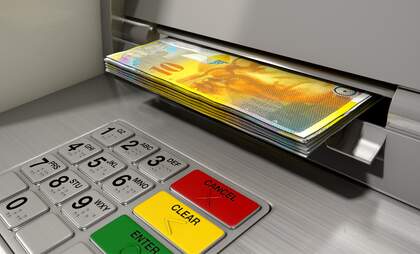Almost as famous as the country’s chocolate and clocks, the Swiss banking system is famous (or infamous) throughout the world for its efficiency and strict privacy laws that don't make it easy for governments and agencies to access the financial data of Swiss nationals without consent.
Setting up a bank account in Switzerland is usually stress-free so long as you have the right documents to hand. Here’s what you need to know about bank accounts, payment methods and other aspects of banking in Switzerland.
Swiss banks
Swiss banks are diverse in what they offer to the customer and - with 242 banks established in the country - you will certainly be able to find a plan to suit your requirements. Larger banks are probably your best bet if you are not familiar with one of the languages of Switzerland. The largest banks in Switzerland have branches all around the world and will be able to serve you in English.
Major Swiss banks
The following banks all have branches nationwide (and even worldwide):
- UBS (acquired Credit Suisse in 2023)
- Raiffeisen
- Migros Bank
- PostFinance
Online banks in Switzerland
The following online banks (also known as neobanks in Switzerland) specialise in digital and mobile banking, meaning they do not have a physical branch office or offer face-to-face services. Instead, they provide their cost-effective services via mobile apps:
Regional Swiss banks
Switzerland is unique in that almost every one of the 26 cantons has its own county bank (Kantonalbank/Banque Cantonale). All deposits into a Swiss regional bank are guaranteed by the state in order to add another layer of financial security for you and your family. Although these banks are great if you need a branch right at your door, in some parts of the country it is unlikely that staff will speak English.
Some of the major cantonal banks that do speak English are:
- Zürcher Kantonalbank
- Luzerner Kantonalbank
- Berner Kantonalbank
- Basler Kantonalbank
- Banque Cantonale de Genève
- Banque Cantonale Vaudoise
- BancaStato
Private Swiss banks
Switzerland prides itself on having some of the most esteemed private banking firms in the world. They are able to provide a far more personal service and are highly experienced in managing large assets. They also offer more options for investing and can secure excellent returns on large investments. Some of the most well-known private banks are:
- Julius Bär
- Clientis
- Vontobel
- EFG International
What is the best bank in Switzerland?
The bank you choose will depend on a few factors, which you can rank according to your personal situation and needs:
Costs
Most banks in Switzerland charge fees (see below) for everything from holding an account and having a debit card to withdrawing cash and making international transfers. When selecting the best bank for you, you should compare these costs to see how they stack up.
Free bank accounts
Many banks in Switzerland will charge you a monthly or annual fee for holding a current account with them, but an increasing number offer free bank accounts, including Migros Bank, and the cantonal banks of Zurich, Thurgau, Aargau, Freiburg and St. Gallen.
Many other banks also offer free accounts to young people or those who are studying in Switzerland, so it’s worth enquiring if your preferred bank offers a special rate for students.
Finally, some banks also offer free current accounts to people who use other banking services with them, for instance if you have a mortgage or savings account with them, if you hold a certain amount of assets, or make a certain number of transactions per year.
English-language services
Not all banks in Switzerland can be relied upon to offer their services in English. If you do not speak one of the languages of Switzerland and would like to conduct your financial affairs in English, you might decide to prioritise a bank that offers this.
Most online banks offer services in English, as do major banks like UBS and PostFinance, as well as the cantonal banks outlined above.
Additional products and services
When weighing up different bank options, you should also consider the other products and services on offer. If you travel regularly, you might value options like free cash withdrawals abroad, or low fees on international money transfers.
Banking fees in Switzerland
You can expect to pay up to 200 Swiss francs per year in fees to your bank, depending on the account and the bank you choose. It’s worth carefully considering these fees before you open an account, as they can make a real difference over the long run. Some of the fees you might incur include:
- Current account fees
- Fees for opening an account
- Fees for annual account statements
- Fees for bank transfers, standing orders and direct debits within Switzerland
- Fees for international bank transfers
- Annual debit card fees
- Fees for withdrawing cash from ATMs outside of your bank’s network
- Fees for debit card purchases from international merchants
Do I need a Swiss bank account?
Opening a Swiss bank account should be one of the first steps you take after moving here. If you are planning to live in Switzerland long-term, you will need a local account to send and receive payments without incurring foreign transaction fees. This includes receiving your salary, paying your rent, setting up your utilities and taking out insurance.
While it would be possible to continue using a foreign bank account, you will almost certainly be charged each time you make payments or withdraw cash in Switzerland. You may also find it difficult if not impossible to set up direct debits with Swiss companies using foreign bank details, so setting up a Swiss bank account will make your life a lot easier.
Swiss bank accounts
There are two main types of Swiss bank accounts:
- Current account
- Savings account
Current account in Switzerland
A current account is a standard bank account in Switzerland, and can be used for all your day-to-day transactions. Most people will open a standard current account, but you can also opt for a premium current account (which depending on the bank may include extras) or a student current account. Many banks charge a monthly fee for holding a current account with them.
Savings account in Switzerland
You can open a savings account at the same time as your current account. A savings account is somewhere where you can save your money and earn interest on your savings.
Most savings accounts in Switzerland do not incur annual fees, but you may be charged penalty fees if you make more than a predetermined number of monthly or annual withdrawals, or withdraw a large amount of money without giving your bank notice.
How to open a bank account in Switzerland
You can open a bank account in Switzerland either online or in person.
Particularly if you have large assets or earn a high salary, it is best to book an appointment with a financial advisor to make sure you get the best service for your needs.
Opening a personal bank account
Opening a personal bank account is the simplest way to start banking in Switzerland. To set up an account you will need:
- A form of ID, such as a passport
- Your Swiss residence permit
- Proof of address in Switzerland
- Proof of attendance at a Swiss university (if you are applying for a student account)
You’ll need to bring these to your chosen bank (you don’t normally need an appointment) to have your details verified and an account opened on the spot. Your debit card and pin number will be sent out separately to you by post.
Opening a bank account online
Many banks also offer the option to open a bank account online. You will be asked to provide the same details.
If you are opening a bank account online, your bank may ask to confirm your identity. This can be done via a video call or simply by asking you to upload proof of your identity, such as your passport and proof of address. Be sure to have these documents handy should your bank require further identity checks.
Applying for a Swiss bank account without a permanent address
Applying for a bank account while still living in temporary accommodation is permitted by most banks, provided that as soon as you move to a more permanent home you inform them of your new address. Proof of residence is required in the form of a rental contract or a deed to buy a house.
Getting your debit card (EC card)
Most Swiss banks issue their customers with debit cards (generally known as EC cards in Switzerland). With a debit card, payments are immediately debited from your account, meaning a transaction won’t go through if your account balance is too low.
Many banks charge their customers for having a debit card. This fee is typically around 50 francs per year. However, an increasing number of banks are now offering complimentary debit cards and waiving these fees.
Until recently, the majority of debit cards in Switzerland were Maestro cards, with a few banks also providing V Pay debit cards from Visa. Now, however, an increasing number of banks are replacing these cards with Debit Mastercards and Visa Debit cards, which can also be used to make online purchases. PostFinance uses its own debit card rather than a Mastercard or Visa debit card.
Credit cards in Switzerland
Your debit card should suffice for the majority of transactions in Switzerland, but you may also want to take out a credit card.
Whereas debit card payments are immediately taken from your account, credit card transactions are charged to the card issuer, which then bills you for the total amount owed once per month. Most people pay their credit card bills once per month in full via direct debit, but you can also spread the cost and be charged interest.
Having a credit card in Switzerland is not only a way to spread your spending, but also an excellent way of improving your ZEK credit score (see below). Most banks provide an option to apply for a credit card while setting up your private bank account, although you will need a good ZEK score to be accepted. Consult your bank on whether you are eligible for a credit card before you apply.
Most Swiss banks will charge you an annual fee for having a credit card, which is usually higher than the fee charged for a debit card, but some banks do offer free credit cards. You will be charged a fee to withdraw cash with a credit card.
You can compare credit cards on the moneyland.ch website. It is also possible to get a credit card directly from an international supplier such as American Express.
Can I do my Swiss banking entirely online?
Although Swiss banks have been slow to embrace banking through the internet, most basic functions are nowadays available online or via mobile app. Those that do offer digital services are usually the larger banks, and so these services are mostly available in English. Some of the things you can do online are:
- Check your bank balance
- Make payments
- Transfer money between your accounts
- Use certain investment tools
- Apply for mortgages
You still need to visit a bank to:
- Set up direct debits and standing orders
- Change your account
- Close your account
SecureSign and Identification Software
Most banks that offer online services require a specific app to be installed on your phone in order to complete online purchases. This involves scanning a QR code on your screen in order to receive a unique code from the bank. This makes online transactions safer and more secure. Some older banks also use mini-pagers to generate codes to enter your accounts.
Payment methods in Switzerland
As well as payments via debit and credit card, the following payment methods are also used in Switzerland:
Mobile & digital payments
If you have a Debit Mastercard or Visa Debit card, you can sync it with your mobile phone to use digital wallets like Apple Pay or Google Pay. Note, however, that these payment systems aren’t compatible with all Swiss banks. You can find which banks are compatible on the Apple Pay and Google Pay websites.
TWINT
TWINT is an app run by major banks that you can use to make payments online, in Swiss stores and between two TWINT users. You can use it by downloading the app onto your phone and registering it with your specific bank. It makes paying for things as easy as scanning a QR code at the till or on a card payment terminal.
Almost all Swiss banks now allow their customers to use TWINT. The app is easy to set up and could save you a lot of time on financial transactions.
eBill
eBill is a digital payment system that allows you to receive invoices directly to your online banking, meaning you can pay them in a few clicks from your banking app or online account. Many companies in Switzerland, including health insurance companies, insurance companies, telecom providers and electricity suppliers are happy to send invoices via eBill, if you request them to.
QR-bills
Some Swiss companies sent out invoices via QR-bills. QR-bills were introduced in 2020 and replaced the red (IS) and orange (ISR) payment slips that were in use prior to this. You can pay a QR-bill in three ways:
- Via mobile banking: Open your banking app, scan the QR code and follow the onscreen instructions.
- Via online banking: Log into your online banking account, scan the QR code via your computer’s camera, and follow the onscreen instructions.
- By mail: Take the QR-bill to a Swiss Post branch or to your bank, and pay the bill.
Direct debits and standing orders
Direct debits involve you giving consent for a third party like a company to make a regular deduction from your account, even if the amount isn’t always the same, while a standing order is an instruction to your bank to make a fixed regular payment to a third party.
The two types of direct debit in Switzerland are LSV+ and Swiss Direct Debit (CH-DD). While PostFinance uses CH-DD, all other banks use LSV+. To set up a direct debit order, you as the account holder need to complete and sign a direct debit authorisation form, including your IBAN. This enables the company to debit the money from your account.
If you want to cancel a direct debit, you can instruct your bank to terminate the direct debit order. If you have previously always paid by direct debit, ensure that you contact the company taking the payments to set up an alternative means of payment.
Setting up a business bank account
If you are starting a business in Switzerland or working as a freelancer, you might decide to set up a business bank account. In some cases, you are required to do this in order to deposit the correct amount of money required to start a new business.
The process for opening a business account is similar to that of opening a private account. As well as documents providing your identity and address, you will also need various details related to your business, such as a record of your turnover and your registration documents. Talk to a representative from your bank, who will be more than willing to take you through the process step by step.
Applying for a loan in Switzerland
Applying for a loan in Switzerland is a possible route to getting the finances you need to invest and start a business. There is a diverse range of loans on offer, with different terms and costs that are based on several criteria. These are:
- Age: You can only apply for a loan in Switzerland if you are over 18 years of age and some banks may even have a maximum age to apply for a loan.
- How long you have lived in Switzerland: Some lenders will also allow residents of Liechtenstein to apply for loans.
- Canton of residence: Some regional banks require you to be resident in the canton they serve.
- Residence permit: Expats with C- and B-permits are far more likely to be accepted for a loan than those with L- and G-permits.
- Your reason for getting a loan.
- Your employment status and income.
- Your ZEK credit score.
Credit score in Switzerland (ZEK)
The Central Office for Credit Information (Zentralstelle für Kreditinformation) or ZEK is the central database that lenders use to access the financial information of Swiss residents. The system is available to credit lending companies such as banks, credit card and loan providers and is used to determine your likelihood of repaying a loan.
Some of the factors that influence your score are:
- Personal information like age and civil status such as a marriage or civil partnership.
- Use of credit cards and your history of credit card repayments including blocked cards.
- Details on your credit history which includes previous loans, previous applications for loans, account overdrafts, cash income and expired loan agreements.
- History of rental contracts and house purchases.
- Bankruptcies and court attendances.
As an applicant for credit, you are allowed and entitled to view your ZEK data at any time. You can do that by accessing the ZEK website. Do bear in mind that the website is only available in German and French.
Swiss bank accounts for non-residents
Most major Swiss banks offer accounts for non-residents (known as offshore bank accounts). These accounts usually have multicurrency options and a wide range of cross-border services. To open an account as a non-resident, you’ll need to provide proof of identity and some paperwork to prove the source of your money. Note that most banks charge high fees for non-resident Swiss bank accounts.
What is an IBAN number?
An International Bank Account Number or IBAN is a number that is unique to your account. The number is universally recognised throughout most of the world. In Switzerland, the number is 19 digits long and begins with a CH. You can use this number to receive payments from an employer or from another account in Switzerland or abroad. You can find this number on most bank statements and sometimes on the back of your credit or debit card.
What is a BIC or SWIFT code?
A BIC or SWIFT code is a code that banks use to recognise each other during financial transactions. Each bank around the world has a recognised SWIFT code that is used to track which bank is being used for transferring money. You will need this code while setting up any form of direct debit or receiving a wage or payment. You can usually find this number on your bank statements.
This page uses affiliate links.







